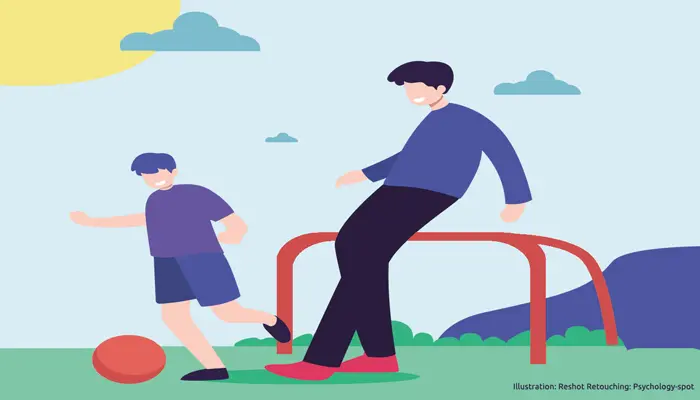
“You have to know how to lose”, is a phrase repeated often by our parents during our childhood and that probably we will repeat to our children, with the secret hope that they will be able to better deal with the hard knocks of life and assume the defeat with sportsmanship.
However, there is nothing better for teaching them to lose than let them lose something that parents usually don’t do. The tendency of the adults to let children always win because they could feel good may cause them psychological problems in the future.
Very often, when we play with the kids, we pretend to lose, to avoid that they cry or make tantrum. In this way children are happy because experience a feeling of power, but in doing so we also take away from them the opportunity to develop these psychological strategies, so necessary to face defeat and failure in real life, to minimize the displeasure of losing.
The tendency to make life easier for children is normal and not particularly harmful, but sometimes we exaggerate. When we try to make easy absolutely everything to them, we don’t think about the consequences that this entails in the formation of their personality.
In this regard, a study conducted at the University of Virginia with children aged 4 and 5 years old, revealed that children who are granted an undeserved victory develop a distorted perception of their abilities.
These psychologists have found that when children have a lot of success in an activity, are less aware of the relevant information they could use to learn about the world, as they believe that this is less important because someone is easing them the way. In practice, solving their problems in their place, prevents them from developing the necessary tools to solve the problems on their own.
Why is it so important that children learn to lose?
– Their self-esteem is protected and strengthened, because who knows how to lose does not consider the defeat something personal, a lack of ability or courage, but as something absolutely normal that happens in different situations, and that can be reversed. Therefore, losses do not affect their self-esteem, on the contrary, they strengthen it.
– Their social skills will be improved, so that they will participate and play with sportsmanship, and also won’t get angry with the others when they lose and won’t cause conflicts.
– They will learn to focus on the activity rather than on the results, then will stop thinking in terms of success and failure and will enjoy much more the activity.
– They will understand the importance of perseverance and commitment, focusing on the possibility of change starting from the mistake, instead of attributing success to luck.
– They will develop a better tolerance to frustration, being able to consider the obstacles as challenges, which will allow them to better deal with adversity, without collapsing and get out strengthened.
– They will learn to be more cooperative and help the others, rather than developing a more competitive and selfish attitude that would cause them problems.
– They will develop a more realistic self-image, which will turn useful to face the future challenges of life, as they will be aware of their skill, ability, potential and limitations.
Therefore, we should never let them win?
The game should always be a fun experience, but we can’t forget that is also an excellent learning opportunity. If parents leave the child always wins, they will prevent him from preparing for the defeats that will undergo during his lifetime. But if the child always loses, it is just as likely he develops a deep frustration.
Therefore, sometimes we can let them win. Although the best strategy is to equate the forces in play. For example, you can give them a small initial advantage before starting, to ensure that the competition is fairer.
When they are very small, we can also give priority to games that do not include competing avoiding those that require more complex skills, because that way we will not be obliged to let them win.
Of course, the age of the child is crucial. When the child is very small the concepts of victory and defeat are often irrelevant, because at this age enjoys much more of the game itself, he doesn’t assume it as a competition. At this stage the most important thing is that the child learns to follow the rules.
Later, to the extent that the child grows, develops his capacity and begins to seek social approval, he will give more importance to the competition and the results of the game, although this will depend very much on the importance that parents give to victories. If as a child they teach him to enjoy the journey, rather than focusing on the final result, the weight of defeat will never be so great.
However, from 4 years of age on parents should start to process the concepts of victory and defeat, without tricks. We must always keep in mind that when the children lose they have the opportunity to handle the situation, the feelings it generates, and recover from it.
How we can turn defeats into victories?
– Validating their feelings by focusing on the positive side. Losing will not make him feel good, but we shouldn’t feel sorry for the child, but confirm his emotions and help him focus on the positive side of the situation, pointing out how you two enjoyed playing together.
– Assuming the defeat as a learning opportunity. If you teach your child that losing is not something negative, but an opportunity to learn and grow, this type of situation won’t affect him so much.
– Changing the concepts of winner and loser. In fact, doesn’t win who arrives first, but who enjoys the most the activity, learns, works and doesn’t give up in front of the obstacles. Therefore, it is important not to excessively exalt the winner or ridicule the loser.
Remember that whatever you sow today you’ll reap it tomorrow. A small defeat in the game can make your child be more prepared to deal with the disappointments, failures and adversities of life.
Source:
Palmquist, C. M. et. Al. (2016) Success inhibits preschoolers’ ability to establish selective trust. Journal of Experimental Child Psychology; 152: 192–204.



